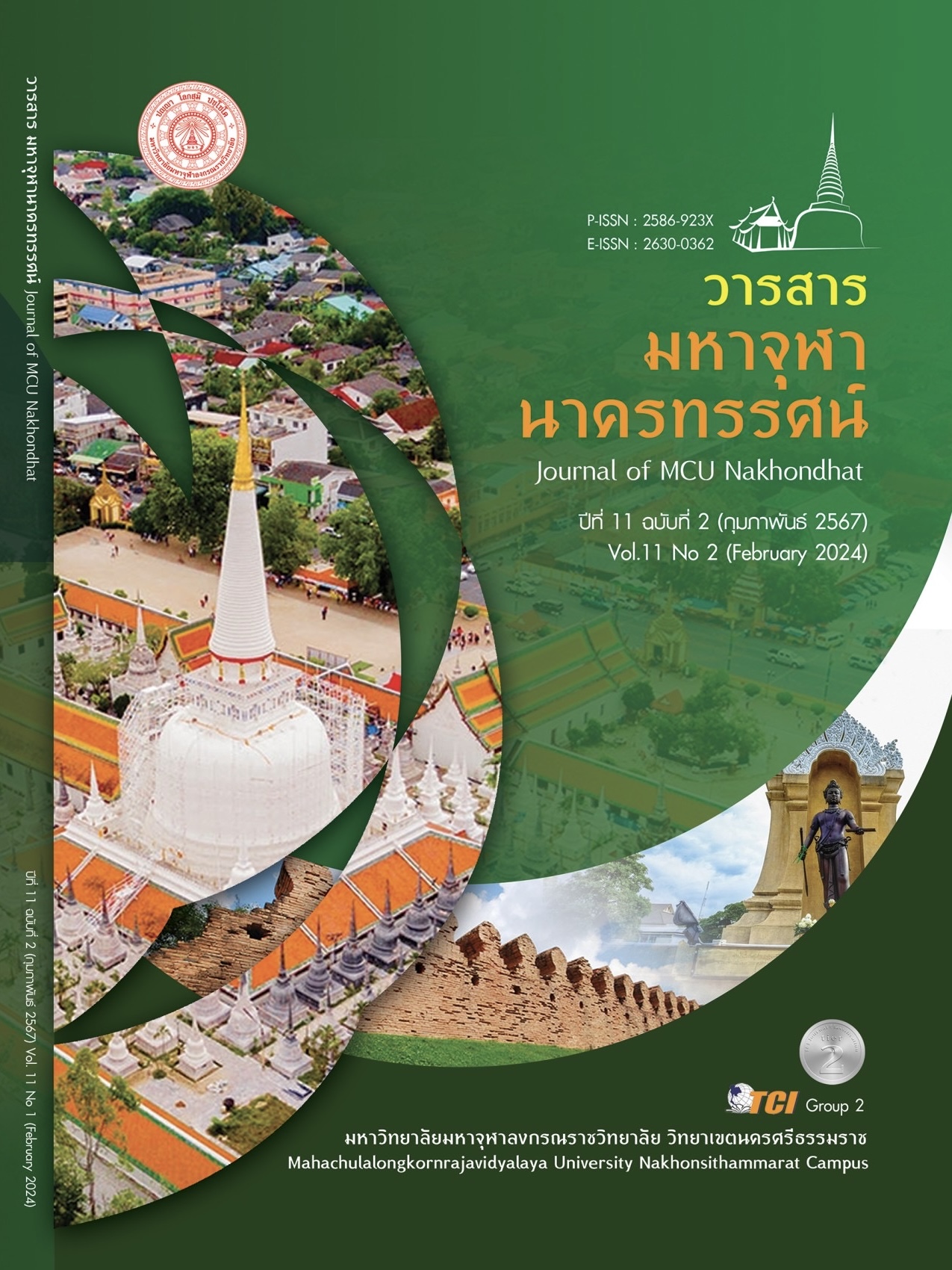DEVELOPING GUIDELINES FOR ACADEMIC ADMINISTRATION USING THE DEMING CYCLE OF PRIVATE SCHOOL UNDER THE OFFICE OF EDUCATION, MAHASARAKHAM PROVINCE
Main Article Content
Abstract
This research article aims to study the current condition. Conditions that depend on the wishes and needs of academic administration and study the academic administration guidelines of private schools Under the jurisdiction of the Maha Sarakham Provincial Education Office The sample groups used in this study include: Administrators and teachers The sample size is determined from Krejci's table. And Morgan randomly selected a sample of 265 people. The tool used to collect the data was a questionnaire. The nature of the questionnaire is a scale of approximately 5 levels. The researcher tested the questionnaire with a group similar to a sample of 30 people to check the quality of the questionnaire. The discriminant power for each item was equal to .67-.85. and the reliability value for the whole version was .94. Statistics used in data analysis Use the mean and standard deviation. and necessary needs Interview form used Structured As for academic administration guidelines Study from schools with good practices. The results found that The present condition overall and in each aspect was found to be at a high level. As for the desired condition at the highest level and necessary needs are in the area of educational supervision Organize brainstorming using the quality cycle. To improve supervision within the school In terms of curriculum development in educational institutions, administrators and teachers work together to plan using the quality cycle. To develop school curriculum from vision, mission, and goals In terms of developing the learning process, teachers should develop themselves in terms of quality learning management. In terms of evaluation and transfer of academic results, administrators and teachers meet using the quality cycle. To set guidelines regarding measurement and evaluation. Research to develop the quality of education Encouraging teachers to conduct research in the classroom.
Article Details

This work is licensed under a Creative Commons Attribution-NonCommercial-NoDerivatives 4.0 International License.
References
กมล ภู่ประเสริฐ. (2545). การบริหารงานวิชาการในสถานศึกษา. (พิมพ์ครั้งที่ 2). กรุงเทพมหานคร: เมธีทิปส์.
กระทรวงศึกษาธิการ. (2546). คู่มือการบริหารสถานศึกษาขั้นพื้นฐานที่เป็นนิติบุคคล. กรุงเทพมหานคร: โรงพิมพ์คุรุสภาลาดพร้าว.
กระทรวงศึกษาธิการ. (2551). หลักสูตรแกนกลางการศึกษาขั้นพื้นฐานพุทธศักราช 2551. กรุงเทพมหานคร: กระทรวง ศึกษาธิการ.
กระทรวงศึกษาธิการ. (2553). พระราชบัญญัติการศึกษาแห่งชาติ พ.ศ. 2542 แก้ไขเพิ่มเติม (ฉบับที่ 3) พ.ศ. 2553. กรุงเทพมหานคร: พริกหวานกราฟฟิค.
บุญชม ศรีสะอาด. (2556). การวิจัยเบื้องต้น. (พิมพ์ครั้งที่ 9) . กรุงเทพมหานคร: สุวีริยาสาส์น.
บุญชม ศรีสะอาด. (2556). วิธีการทางสถิติสำหรับการวิจัย เล่ม 1 (พิมพ์ครั้งที่ 5). กรุงเทพมหานคร: สุวีริยาสาส์น.
ปรียาพร วงศ์อนุตรโรจน์. (2553). การบริหารงานวิชาการ. กรุงเทพมหานคร: ศูนย์สื่อเสริมกรุงเทพมหานคร.
พิชิต ฤทธิ์จรูญ. (2544). แนวทางการวิจัยเพื่อพัฒนาการเรียนรู้. บทบาทครูกับการวิจัยในชั้นเรียน. กรุงเทพมหานคร: พริกหวานกราฟฟ์คจํากัด.
มรกต วงเนตร. (2554). การศึกษาปัญหาและแนวทางการพัฒนาครูเพื่อการจัดการเรียนรู้ที่ส่งเสริมทักษะการคิดของนักเรียนด้วยวงจรคุณภาพเดมมิ่ง ในโรงเรียนขยายโอกาสทางการศึกษา สังกัดสำนักงานเขตพื้นที่การศึกษาประถมศึกษาพระนครศรีอยุธยา เขต 1. ใน วิทยานิพนธ์ปริญญาครุศาสตรมหาบัณฑิต สาขาวิชาการบริหารการศึกษา. บัณฑิตวิทยาลัย มหาวิทยาลัยราชภัฏพระนครศรีอยุธยา.
สันติ บุญภิรมย์. (2552). การบริหารงานวิชาการ. กรุงเทพมหานคร: บุ๊คพอยท์.
สำนักงานคณะกรรมการส่งเสริมการศึกษาเอกชน. (2554). แนวทางการดำเนินงานตรวจสอบทบทวนระบบประกันคุณภาพภายในสถานศึกษาเอกชนประเภทสามัญศึกษา. กรุงเทพมหานคร: โรงพิมพ์ สก.สค.ลาดพร้าว.
Mycoted. (2004). Plan Do Check Act (PDCA). Retrieved July 16 , 2022, from http://www.mycoted. com /creativity/techniques/pdca.php


